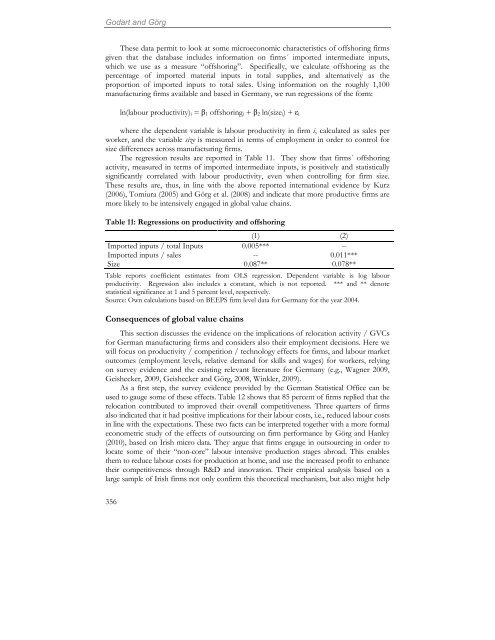The Role of Global Value Chains for German Manufacturing
The Role of Global Value Chains for German Manufacturing
The Role of Global Value Chains for German Manufacturing
You also want an ePaper? Increase the reach of your titles
YUMPU automatically turns print PDFs into web optimized ePapers that Google loves.
Godart and Görg<br />
<strong>The</strong>se data permit to look at some microeconomic characteristics <strong>of</strong> <strong>of</strong>fshoring firms<br />
given that the database includes in<strong>for</strong>mation on firms´ imported intermediate inputs,<br />
which we use as a measure “<strong>of</strong>fshoring”. Specifically, we calculate <strong>of</strong>fshoring as the<br />
percentage <strong>of</strong> imported material inputs in total supplies, and alternatively as the<br />
proportion <strong>of</strong> imported inputs to total sales. Using in<strong>for</strong>mation on the roughly 1,100<br />
manufacturing firms available and based in <strong>German</strong>y, we run regressions <strong>of</strong> the <strong>for</strong>m:<br />
356<br />
ln(labour productivity)i = β1 <strong>of</strong>fshoringi + β2 ln(sizei) + εi<br />
where the dependent variable is labour productivity in firm i, calculated as sales per<br />
worker, and the variable size is measured in terms <strong>of</strong> employment in order to control <strong>for</strong><br />
size differences across manufacturing firms.<br />
<strong>The</strong> regression results are reported in Table 11. <strong>The</strong>y show that firms´ <strong>of</strong>fshoring<br />
activity, measured in terms <strong>of</strong> imported intermediate inputs, is positively and statistically<br />
significantly correlated with labour productivity, even when controlling <strong>for</strong> firm size.<br />
<strong>The</strong>se results are, thus, in line with the above reported international evidence by Kurz<br />
(2006), Tomiura (2005) and Görg et al. (2008) and indicate that more productive firms are<br />
more likely to be intensively engaged in global value chains.<br />
Table 11: Regressions on productivity and <strong>of</strong>fshoring<br />
(1) (2)<br />
Imported inputs / total Inputs 0.005*** --<br />
Imported inputs / sales -- 0.011***<br />
Size 0.087** 0.078**<br />
Table reports coefficient estimates from OLS regression. Dependent variable is log labour<br />
productivity. Regression also includes a constant, which is not reported. *** and ** denote<br />
statistical significance at 1 and 5 percent level, respectively.<br />
Source: Own calculations based on BEEPS firm level data <strong>for</strong> <strong>German</strong>y <strong>for</strong> the year 2004.<br />
Consequences <strong>of</strong> global value chains<br />
This section discusses the evidence on the implications <strong>of</strong> relocation activity / GVCs<br />
<strong>for</strong> <strong>German</strong> manufacturing firms and considers also their employment decisions. Here we<br />
will focus on productivity / competition / technology effects <strong>for</strong> firms, and labour market<br />
outcomes (employment levels, relative demand <strong>for</strong> skills and wages) <strong>for</strong> workers, relying<br />
on survey evidence and the existing relevant literature <strong>for</strong> <strong>German</strong>y (e.g., Wagner 2009,<br />
Geishecker, 2009, Geishecker and Görg, 2008, Winkler, 2009).<br />
As a first step, the survey evidence provided by the <strong>German</strong> Statistical Office can be<br />
used to gauge some <strong>of</strong> these effects. Table 12 shows that 85 percent <strong>of</strong> firms replied that the<br />
relocation contributed to improved their overall competitiveness. Three quarters <strong>of</strong> firms<br />
also indicated that it had positive implications <strong>for</strong> their labour costs, i.e., reduced labour costs<br />
in line with the expectations. <strong>The</strong>se two facts can be interpreted together with a more <strong>for</strong>mal<br />
econometric study <strong>of</strong> the effects <strong>of</strong> outsourcing on firm per<strong>for</strong>mance by Görg and Hanley<br />
(2010), based on Irish micro data. <strong>The</strong>y argue that firms engage in outsourcing in order to<br />
locate some <strong>of</strong> their “non-core” labour intensive production stages abroad. This enables<br />
them to reduce labour costs <strong>for</strong> production at home, and use the increased pr<strong>of</strong>it to enhance<br />
their competitiveness through R&D and innovation. <strong>The</strong>ir empirical analysis based on a<br />
large sample <strong>of</strong> Irish firms not only confirm this theoretical mechanism, but also might help









